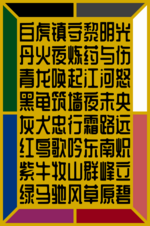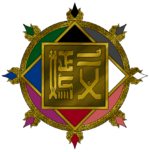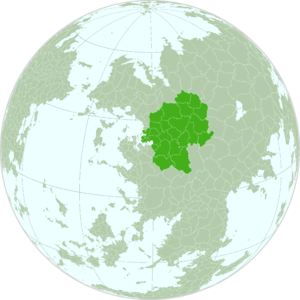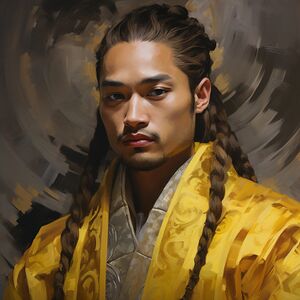Yanwen: Difference between revisions
No edit summary |
No edit summary |
||
| (One intermediate revision by the same user not shown) | |||
| Line 6: | Line 6: | ||
| flag link = Yanwen_Flag | | flag link = Yanwen_Flag | ||
| coa link = Yanwen_Coat_of_Arms | | coa link = Yanwen_Coat_of_Arms | ||
| Motto = ''Bai guards the dawn with the tiger’s fierce might, | | Motto = <br> ''Bai guards the dawn with the tiger’s fierce might,''<br> | ||
Dan brews both healing and poison in night. | ''Dan brews both healing and poison in night.''<br> | ||
Qing calls the dragon from rivers untamed, | ''Qing calls the dragon from rivers untamed,''<br> | ||
Hei builds the tortoise’s walls, dark and framed. | ''Hei builds the tortoise’s walls, dark and framed.''<br> | ||
''Hui’s loyal hounds roam the frost-covered ways,''<br> | |||
Hui’s loyal hounds roam the frost-covered ways, | ''Hong’s bright fowl sing of the southeast’s blaze.''<br> | ||
Hong’s bright fowl sing of the southeast’s blaze. | ''Zi tends the cattle where mountains still grow,''<br> | ||
Zi tends the cattle where mountains still grow, | ''Lu rides the winds where green pastures glow.'' | ||
Lu rides the winds where green pastures glow.'' | |||
| Anthem = Ten Thousand Years | | Anthem = Ten Thousand Years | ||
| anthem link = Ten_Thousand_Years | | anthem link = Ten_Thousand_Years | ||
Latest revision as of 06:16, 2 January 2025
| Yanwen 嫣文 | |
| Flag | Coat of arms |
|---|---|

|

|
| Motto: Bai guards the dawn with the tiger’s fierce might, Dan brews both healing and poison in night. | |
| Anthem: Ten Thousand Years | |
| Locator map | |

| |
| Capital city | Jīndu (金都) |
| Largest city | Jīndu (金都) |
| Official language | Yānhuà (嫣話) |
| Other languages | Yá, Yú |
| Ethnic group | Yan |
| Religion | Shuocianism, Kin |
| Demonym(s) | Yan, Yannic |
| Government | |
| Government Type | Imperial Oligarchy |
| Emperor | Jīyào (卟耀) |
| Colour Chancellors | White: Qiáogǔ Biāo (橋谷彪) Red: Yínwéi Zhà (銀圍灹) Black: Zédù Dài (窄肚䲦) Rose: Jīngdòng Jié (晶洞巀) Green: Zhàipíng Lù (寨坪逯) Purple: Grey: Blue: |
| Legislature | The Tǒnghuì (統會) |
| Establishment | |
| The First Dynasty | 5104 RH |
| Area | |
| Total | 6,896,101.99 km2 |
| Water % | 0.0% |
| Population | |
| Total | 794,996,430 |
| Density | 115.28/km2 |
| Economy | |
| Economy type | Communitarian Capitalism |
| GDP (total) | Ꞡ 1,873,465,872,308.74 |
| GDP per capita | Ꞡ 2,356.57 |
| Currency | Chao (鈔) |
| Inequality index | 0.0 |
| Development index | 0.0 |
| Other information | |
| Time zone | TBC |
| Driving side | right |
| Calling code | +116 |
| Internet code | /YAN |
Yanwen (嫣文) is a large country in western Davai, bordering the Sensumen Sea, as well as the islands of Kamura, to the west. Yanwen is notable as being a civilization of eight bèi (輩) or factions, each of which has competing interests in the empire; the emperor, all-powerful though he technically may be, is there to act more as a referee. Despite this, each faction has seen its way to advancing the development of Yanwen considerably as time has gone on. Yanwen is also historically famous for its silk and its tea.
As of the moment, Yanwen also claims sovereignty over the nearby thalassocracy of Hui, and potentially over the nations of Tianji and Guiya as well. International relations are somewhat fraught on account of this.
Etymology
Yanwen is derived from yān (嫣), itself derived from the Old Yanhua word *qhran, meaning "beautiful". Yān as a word is used for both the primary river system in Yanwen, and for the Yan people who spread out from along its banks. The second word, wén (文), more broadly refers to "culture", the essence of the people who live there rather than the land itself. Wén, for the Yan people, effectively means "nation".
Another popular name within the country is Yǒngguó (永國), roughly meaning "the eternal empire".
History
Prehistory
The region that would become Yanwen was originally inhabited, to the south, by Austro-Raian peoples related to the modern Medaru. The first archaeological records of their civilizations appear around 50,000 years before the present day.
The north, meanwhile, was colonized some time later, around 35,000 years ago, by a Davaian people related to the modern Shriaav.
The ancestors of the modern Yan and Xiangren peoples appear to have arrived in the region around 25,000 years before the present day, as a split-away from the Davaian culture. With them they brought a curious moiety system, cycling through various "colours" depending on birth-parent. In this way they maintained an oligarchic society, each "colour" having its own leaders responsible for the upkeep of their extended kith.
These proceeded in two different ways. For men, the order of succession was: White, Red, Blue (or rather blue-green), and Black for one moiety, and Rose, Violet, Green (or rather emerald), and Grey for the other. For women, it was: Black, Grey, White, and Rose for one moiety, and Green, Blue, Violet, and Red for the other.
Senatorial Period (3500-4300 RH)
During this time, the moiety systems of the proto-Yannic peoples began to evolve into an oligarchic structure. The pyramid-cities built along the shores of the Yan River each had their own distinct "ninths"—eight for the residences of the Elders of the eight moieties, and a ninth for council meetings for each. During this time, one's moiety might well matter more than one's state of birth; there are records in The Jade Archives of warriors who marked their moiety through colour and speech in battle, and refused to fight any who belong to the same kith.
The Elders could be from any family, any background; one did not even need to be old, merely to have distinguished oneself in a meaningful way in society.
During this time we see the beginning of bronze-working—first arsenic, then tin.
The Collapse (4300-5104 RH)
During this period, severe ecological damage combined with an burgeoning population led to a collapse of the traditional civilizations along the river, with many emigrating to elsewhere in the region. We also begin to see a change in the nature of the bèi during this period—as well as a shift in who dominated the area.
For many families who settled new cities, the old moiety system was merely an unnecessary constraint, one that got in the way of focusing power. They set about changing this. A common trend along the subsidiary rivers to the north was that the new "royal" family took over outright, claiming the name of the land as their own. They could now marry anyone from any moiety, if it helped in consolidating power. Meanwhile, further to the south, the moieties were retained—but they turned into factions instead, each controlling a portion of the land for themselves and maintaining their own militaries. In the far north, well beyond the reach of the Yan River, the moieties became bloodlines, each of which controlled certain assets and were considered equal to one another. On the Jianzhu Coast, the moieties became trading societies, subordinate to the kings of the cities but with considerable power of commerce. Only along the Three Southern Sisters—the Yuweilu, Biying, and Wengzu Rivers—and on the Tianji Islands just beyond the Gulf of Yinji did the moiety system remain relatively unchanged.
The First Dynasty (5104-5479 RH)
The First Dynasty arose from the powers in the city of Língchéng, along the Upper Yan River.
Geography
Bianchu Forest
The Bianchu Forest is old, thick, and deep, acres upon acres of tall, dark coniferous trees.
Upper Yan

The Upper Yan, although not as fertile as the Lower Yan, has more easily defensible positions, allowing for a multiplicity of fortifications over the past four thousand years.
Lower Yan
The lower Yan contains some of the flattest and most fertile land in the entire country, and the majority of the agricultural population is focused on these areas. Understandably, it also contains some of the most important cities historically, including Jīndu, and the capital province of Shídì (石地).
Jianzhu
Jianzhu is the southernmost extent of the Yan River, the northern shore of the Yinji Gulf, a large estuary with somewhat brackish water leading out into the Sensumen Sea. The area has seen much exchange with the southern coast, and thus has a substantial population of Yá (涯; Yá Ngàaih) families and merchants from Guiya to the south in permanent residence.
Zhugao Highlands
The Zhugao Highlands in the south mark one traditional edge of the territories of various empires in Yanwen. They are also an excellent source of many of the metals and minerals required for the upkeep of various empires.
Government
The Factions
It is impossible to understand the culture of Yanwen without discussing the bèi. This word, while in the modern day referring to something that might be translated as "faction", initially meant something closer to "moiety". In historical Yanwen, one passed from one moiety to another over the generations, in a specific cycle, dictating certain rituals that one could perform and certain groups that one could not marry into.
In recent centuries, the bèi have become more obstreperous, each seeking their own dominions within the country and outside it. To their minds, colonial efforts should be permitted without fear of disagreement from nearby nations; they are, after all, the legitimate successors to the empire of Shuǎng (爽), who once laid claim to the entirety of the known world.
There are certain surnames associated with each of the factions, giving them specific affiliations.
Bai
Bai, or white, is associated with the east and tigers.
Surnames associated with this faction include Xiáo (霄), Biāo (彪), and Guó (虢).
Dan
Dan, or red, is associated with the south and firebirds. Traditionally this faction has been most associated with medicine and medical practitioners, and today still deals the most in such matters, including pharmaceutical chemicals (and, for that matter, poisons).
Surnames associated with this faction include Zhèn (鴆) and Zhà (灹).
Qing
Qing, or blue-green, is associated with the west and dragons.
Surnames associated with this faction include Shēng (䲼) and Lán (灆).
Hei
Hei, or black, is associated with the north and tortoises. It is notable that they have never gotten on well with the Lu moiety.
Surnames associated with this faction include Dài (䲦) and Tóng (䶱).
Hui
Huī (灰), or grey, is associated with the northeast and dogs.
Hong
Hong, or rose, is associated with the southeast and fowl. They have a longstanding alliance with the Society of Zhi on the Jianzhu Coast.
Surnames associated with this faction include Jié (巀) and Wéi (維).
Zi
Zǐ (紫), or purple, is associated with the southwest and cattle.
Lu
Lù (綠), or emerald green, is associated with with the northwest and horses. It is notable that they have never gotten on well with the Hei moiety.
Surnames associated with this faction include Lù (逯).
The Emperor

The Emperor is the de jure ruler of Yanwen. In practice, however, he acts more like a moderator for the Factions, ensuring that no one side grows too powerful. He is also responsible for the mint, the civil service, and the Golden Army, the three legs upon which the tripod of government stands.
The emperor has a colour of his own: yellow, or Huang, by which his decisions are known among the other Factions. There is also a Zong or brown “faction”, referring to those peasants outside the scope of any Faction and thus beholden to the Emperor himself. Both of these are marked by the sacred direction of the centre, and by the totem animal (so to speak) of a wolf.
Tonghui
The Tǒnghuì (統會) is where the interests of the bèi coincide with the judgement of the Emperor. A council hall with three members from each faction represented, the King presides over affairs of state, choosing particular subjects of importance to discuss with the factions. Sometimes it affects the realm as a whole; sometimes it is an admonishment regarding a conflict between two or more factions.
The Tonghui currently meets at the Hall of Eight Sides, built by 7641 during the reign of Jiyao's grandfather, Emperor Yínwàng (崟望).
Economy
Under Yannic law, the emperor owns all land, all resources, and all infrastructure within the country. In practice, much of this is "loaned" to various bèi, for some part of the decade, in order for them to make adequate use of the land and resources. There is a single currency, the chāo (鈔), but each bèi has its own banks even if it does not maintain its own mints.
The majority of the people of Yanwen belong to one faction or another. Individually, they do not earn a great deal; the majority of their wealth goes straight to the factions, who nevertheless see it in their best interests to maintain the infrastructure provided by the Imperial Government.
Industries
Among the chief industries practiced by all factions and the imperial division are the production of tea, the production of silk, the production of porcelain, and the production of paper.
Military
Military Policy
As far as the current Tǒnghuì is concerned, the entirety of those nations who claim descent from the inhabitants of the Yan River should fall under their control.
Culture
Religion
Shuocianism remains the primary faith practiced in the country, acting as the backbone of most cultural and religious practices. There is particular emphasis placed on community-building in rituals and celebrations alike.
Kin, although mostly practiced on the islands to the west, still maintains some adherents in the coastal areas of the country. The belief in a dawn-goddess is also quite important in the southwest, where the spirit known as Liáng (亮) protects sailors and pregnant women alike.
Zhiwu
Essential to understanding the political and indeed personal life of Yanwen is to understand zhīwǔ (知舞), which has no direct translation but might be best called "Playing the Game". One can never be certain what one's opponent is truly saying; one can never be certain that one's allies will truly back one up without thought for their own cause. And yet one must appreciate them regardless, and enjoy their company, and manoeuvre as they do with no hard feelings—for the game no longer ends in death. Instead, it is a matter of keeping the peace.
Wuwei
The opposite side of the coin from zhīwǔ is wúwéi (無為), "effortless action", which is the watchword of the emperor. When one is in a position of command, it is not enough that one may speak first, and interrupt one's lessers; one has to speak with purpose and wisdom, in theory generated spontaneously from a tranquil mind that observes the Game and knows when to suggest a move to one player or another.